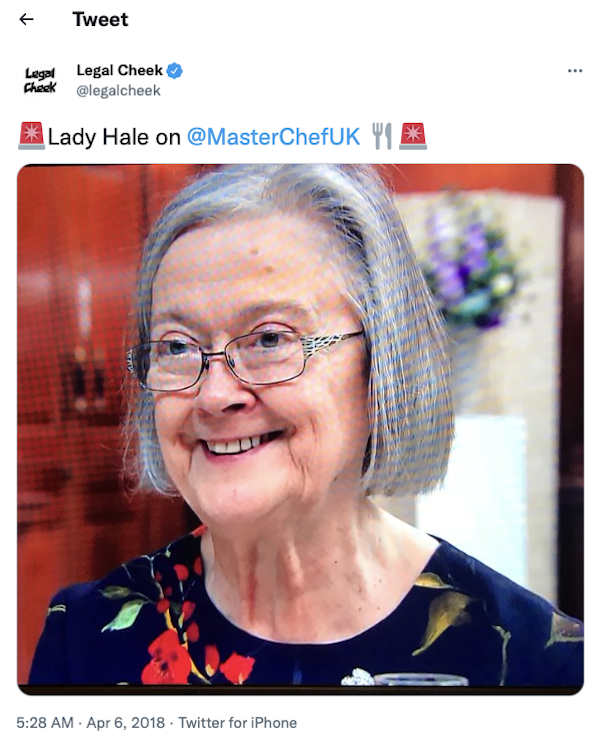Sifting the digital histories of lawyers headed to the judiciary ... Social media engagement that shows a life led more fully may also act as a disqualification ... Judges being louche as youngsters is not something we're used to ... We should adapt, otherwise the selection pond gets smaller ... From Nina Dillon Britton
It is easy to look to America's recent senate nomination hearings of its newest Supreme Court associate justice - Ketanji Brown Jackson - and bask in smug contentment that our judicial appointment process could never see such lows.
We are truly fortunate that we don't have to watch High Court nominees asked whether they think babies are racist.
Nevertheless, there is always something to be learnt from the American political pantomime. The appointment process theatre reminds us that judges' pasts matter, and that is not limited to their judicial records.
Much work was made, for example, of Justice Jackson's law school note about the constitutionality of indefinite detention of child sexual offenders.
While governments here keep a sharp eye on the political colour, tone and perspective of prospective High Court candidates, as well as their legal smarts, we are still a long way from the gruelling US public inspection process.
In a generation, however, politicians will be sifting through the much lengthier digital histories of a generation of lawyers who grew up online.
Candidates will carry records going back decades, archiving their relationships, political opinions, activities, affiliations, lifestyles and mistakes.
A number of fine lawyers will be disqualified because of social media posts made in their youth. Candidates' posts will out them as too political (or the wrong kind of political) or as drinkers, sexters, recreational drug-users or just good-time-havers.
Indeed, it is unclear who - if anyone - will remain a viable candidate.
Should some slip through the cracks, these histories will provide fodder for apprehended bias applications. We might already be able to glimpse the future. In Gaynor v Local Court of NSW & Ors [2019], Justice Harrison was given the unenviable task of deciding an application for recusal for apprehended bias due to Facebook posts made by his tipstaff.
The litigant - a conservative, anti-marriage equality blogger - based his application on a Facebook post published by the tippy, promoting a university production titled "Peter Pansexual" and reviewing it as a "diverse, nuanced portrayal of the many shades of sexuality".
The application also noted the tipstaff was "Facebook friends" with another judge's tipstaff, who had posted in support of queer rights.
Justice Harrison had the sense to knock back the application, noting that "judges make law, not their staff".
That raises the question as to how a similar application, made in a future when the tipstaff is now judge, might be handled.
It is difficult to overstate how usual it is for posts, such as the tipstaffs', to be made. Law students who have ventured beyond torts classrooms and into theatre productions, news reporting, student politics campaigns or social movements will leave proof on social media pages that they do not control and will likely never be deleted.
It would not occur to the vast majority of students to request at the time their involvement be hidden. In any case, the answer would likely be "no".
Lawyers cultivated by diverse interests, who are passionate about the world beyond their studies or their own immediate focus, surely would be assets to the judiciary and the legal profession more broadly.
There is a small minority of ambitious young people who have, from a young age, been cautious and image obsessed, wary of how their pursuits might be perceived.
They have carefully curated their online personas precisely for assessment by future employers or judicial appointment panels. But confining judicial candidates to this tiny pond would exclude people who had the ordinary experience of growing up online, and would create a judiciary more remote than is popularly perceived to be the case now.
For centuries, judges have been able to uphold an image of impartiality by hiding much of themselves from the public - limiting their public engagement to edited judgments and speeches (or, in the exceptional case of Baroness Hale: in a Master Chef appearance).
 Lady Hale sampled fish dishes on MasterChef
Lady Hale sampled fish dishes on MasterChef
There are two paths forward.
The first is to simply keep up the act, even as the mask keeps slipping. Politicians will make inconsistent, politically-convenient use of these materials to exclude candidates for arbitrary reasons, justifying the relevance of embarrassing online histories for candidates they don't like and overlooking the histories of those they do.
Apprehended bias claims, heard by judges themselves, will be regarded narrowly, with judges downplaying the relevance of particular evidence from social media.
The second is to use this as an opportunity to be more honest about the kinds of people judges are. They are biased, flawed people with embarrassing histories and political opinions, who make their best attempts at rising above these.
Appointees should be judged on their legal records alone because we would trust that they will try not be influenced by their own views and experiences.
Apprehended bias claims should be approached with the knowledge that a reasonable person, who herself is familiar with social media, would know that not all internet detritus is compelling evidence of a judge's current state of mind.
While for my generation the gap between the ideal and reality of the judiciary might be more obvious, it will not be new. Judges have always been imperfect - only because they're human and we haven't been able to recruit anyone else to do the job.
Being honest about that would give them more, not less, authority as adjudicators. Somewhere out in the digital ether, there is already a photo of a future High Court justice drinking from a goon sack as a teenager. I'm sure she'll be great.
Nina Dillon Britton